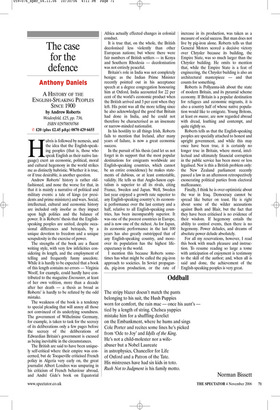The case for the defence
Anthony Daniels
A HISTORY OF THE ENGLISH-SPEAKING PEOPLES SINCE 1900 by Andrew Roberts Weidenfeld, £25, pp. 736, ISBN 02970850768 ✆ £20 (plus £2.45 p&p) 0870 429 6655 Hubris is followed by nemesis, and the idea that the English-speaking peoples (that is, those who speak English as their native language) exert an economic, political, moral and cultural hegemony in the world strikes me as distinctly hubristic. Whether it is true, or if true desirable, is another question.
Andrew Roberts’ history is rather oldfashioned, and none the worse for that, in that it is mainly a narrative of political and military events: a tale of kings (or presidents and prime ministers) and wars. Social, intellectual, cultural and economic history are included only insofar as they impact upon high politics and the balance of power. It is Roberts’ thesis that the Englishspeaking peoples are united, despite occasional differences and betrayals, by a unique devotion to freedom and a unique scrupulosity in the exercise of power.
The strengths of the book are a fluent writing style, with very few infelicities considering its length, and the employment of telling and frequently funny anecdote. While it is hardly to be expected that a book of this length contains no errors — Virginia Woolf, for example, could hardly have contributed to the magazine Encounter, at least of her own volition, more than a decade after her death — a thesis as broad as Roberts’ is hardly to be refuted by the odd mistake.
The weakness of the book is a tendency to special pleading that will annoy all those not convinced of its underlying soundness. The government of Wilhelmine Germany, for example, is taken to task for the secrecy of its deliberations only a few pages before the secrecy of the deliberations of Edwardian Britain’s government is excused as being inevitable in the circumstances.
The British are said to have been uniquely self-critical where their empire was concerned, but de Tocqueville criticised French policy in Algeria very early on, the great journalist Albert Londres was unsparing in his criticism of French behaviour abroad, and André Gide’s book on Equatorial Africa actually effected changes in colonial conduct.
It is true that, on the whole, the British decolonised less violently than other European nations; but where there were fair numbers of British settlers — in Kenya and Southern Rhodesia — decolonisation was not entirely peaceful.
Britain’s role in India was not completely benign: as the Indian Prime Minister recently pointed out in his acceptance speech at a degree congregation honouring him at Oxford, India accounted for 22 per cent of the world’s economic product when the British arrived and 3 per cent when they left. His point was all the more telling since he also acknowledged the good that Britain had done in India, and he could not therefore be characterised as an insensate or narrow-minded nationalist.
In his hostility to all things Irish, Roberts fails to mention that Ireland, after many years of failure, is now a great economic success.
In the pursuit of his thesis (and let us not forget in its support that the most popular destinations for emigrants worldwide are English-speaking countries, which cannot be an entire coincidence) he makes statements of dubious, or at least contestable, validity. He tells us that Anglo-Saxon capitalism is superior to all its rivals, citing France, Sweden and Japan. Well, Sweden last year enjoyed a growth rate superior to any English-speaking country’s; its economic performance over the last century and a half, relative to all English-speaking countries, has been incomparably superior. It was one of the poorest countries in Europe, and is now one of the richest. As for Japan, its economic performance in the last 100 years has also greatly outstripped that of any English-speaking country, and moreover its population has the highest lifeexpectancy in the world.
I mention this because Roberts sometimes has what might be called the pig-iron approach to societies. In Soviet propaganda, pig-iron production, or the rate of increase in its production, was taken as a measure of social success. But man does not live by pig-iron alone. Roberts tells us that General Motors scored a decisive victory over Chrysler because its building, the Empire State, was so much larger than the Chrysler building. He omits to mention that, while the Empire State is a feat of engineering, the Chrysler building is also an architectural masterpiece — and that counts for something.
Roberts is Pollyanna-ish about the state of modern Britain, and its pyramid scheme economy. If Britain is a popular destination for refugees and economic migrants, it is also a country half of whose native population would like to emigrate. Young Britons, at least en masse, are now regarded abroad with dread, loathing and contempt, and quite rightly so.
Roberts tells us that the English-speaking peoples are specially attached to honest and upright government, and while this may once have been true, it is certainly no longer true in Britain, where moral, intellectual and ultimately financial corruption in the public service has been more or less legalised. Nor is this a British problem only: the New Zealand parliament recently passed a law in an afternoon retrospectively exonerating political parties from electoral malfeasance.
Finally, I think he is over-optimistic about the war in Iraq. Democracy cannot be spread like butter on toast. He is right about some of the wilder accusations against Bush and Blair, but the fact that they have been criticised is no evidence of their wisdom. If hegemony entails the ability to control events, then there is no hegemony. Power deludes, and dreams of absolute power delude absolutely.
For all my reservations, however, I read this book with much pleasure and instruction. To resume reading so large a tome with anticipation of enjoyment is testimony to the skill of the author; and, when all is said and done, the achievement of the English-speaking peoples is very great.


















































































































 Previous page
Previous page